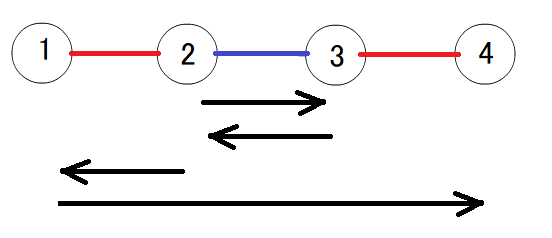9533: ABC222 —— E - Red and Blue Tree
[Creator : ]
Description
Given are a tree with $N$ vertices, a sequence of $M$ numbers $A=(A_1,\ldots,A_M)$, and an integer $K$.
The vertices are numbered $1$ through $N$, and the $i$-th edge connects Vertices $U_i$ and $V_i$.
We will paint each of the $N-1$ edges of this tree red or blue. Among the $2^{N-1}$ such ways, find the number of ones that satisfies the following condition, modulo $998244353$.
Condition:
Let us put a piece on Vertex $A_1$, and for each $i=1,\ldots,M-1$ in this order, move it from Vertex $A_i$ to Vertex $A_{i+1}$ along the edges in the shortest path. After all of these movements, $R-B=K$ holds, where $R$ and $B$ are the numbers of times the piece traverses a red edge and a blue edge, respectively.
The vertices are numbered $1$ through $N$, and the $i$-th edge connects Vertices $U_i$ and $V_i$.
We will paint each of the $N-1$ edges of this tree red or blue. Among the $2^{N-1}$ such ways, find the number of ones that satisfies the following condition, modulo $998244353$.
Condition:
Let us put a piece on Vertex $A_1$, and for each $i=1,\ldots,M-1$ in this order, move it from Vertex $A_i$ to Vertex $A_{i+1}$ along the edges in the shortest path. After all of these movements, $R-B=K$ holds, where $R$ and $B$ are the numbers of times the piece traverses a red edge and a blue edge, respectively.
Input
Input is given from Standard Input in the following format:
```
$N$ $M$ $K$
$A_1$ $A_2$ $\ldots$ $A_M$
$U_1$ $V_1$
$\vdots$
$U_{N-1}$ $V_{N-1}$
```
```
$N$ $M$ $K$
$A_1$ $A_2$ $\ldots$ $A_M$
$U_1$ $V_1$
$\vdots$
$U_{N-1}$ $V_{N-1}$
```
Output
Print the answer.
Constraints
- $2 \leq N \leq 1000$
- $2 \leq M \leq 100$
- $|K| \leq 10^5$
- $1 \leq A_i \leq N$
- $1\leq U_i,V_i\leq N$
- The given graph is a tree.
- All values in input are integers.
- $2 \leq M \leq 100$
- $|K| \leq 10^5$
- $1 \leq A_i \leq N$
- $1\leq U_i,V_i\leq N$
- The given graph is a tree.
- All values in input are integers.
Sample 1 Input
4 5 0
2 3 2 1 4
1 2
2 3
3 4
Sample 1 Output
2
If we paint the 1-st and 3-rd edges red and the 2-nd edge blue, the piece will traverse the following numbers of red and blue edges:
- 0 red edges and 1 blue edge when moving from Vertex 2 to 3,
- 0 red edges and 1 blue edge when moving from Vertex 3 to 2,
- 1 red edge and 0 blue edges when moving from Vertex 2 to 1,
- 2 red edges and 1 blue edge when moving from Vertex 1 to 4,
for a total of 3 red edges and 3 blue edges, satisfying the condition.

Another way to satisfy the condition is to paint the 1-st and 3-rd edges blue and the 2-nd edge red. There is no other way to satisfy it, so the answer is 2.
Sample 2 Input
3 10 10000
1 2 1 2 1 2 2 1 1 2
1 2
1 3
Sample 2 Output
0
There may be no way to paint the tree to satisfy the condition.
Sample 3 Input
10 2 -1
1 10
1 2
2 3
3 4
4 5
5 6
6 7
7 8
8 9
9 10
Sample 3 Output
126
5 8 -1
1 4 1 4 2 1 3 5
1 2
4 1
3 1
1 5
2